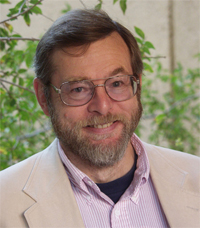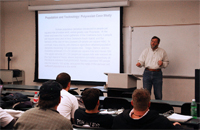Q&A with Brad Allenby
Dr. Brad Allenby is Lincoln Professor of Engineering and Ethics, Professor in the School of Sustainable Engineering and the Built Environment, and Professor of Law. He is also Founding Director of the Center for Earth Systems Engineering and Management and an affiliated faculty member of the School of Sustainability. In 2008 he was named a Carnegie Foundation U.S. Professor of the Year. His research addresses Earth systems engineering and the ethical and social issues of emerging technologies.
How did your early career lead you to “sustainability” as a field of work?
More than 15 years ago, a few of us at AT&T and elsewhere began working on the ideas of industrial ecology and design for environment. From there, it was a natural extension to address sustainability issues because industrial ecology techniques provided a bridge between the practical worlds of business and engineering and the more theoretical frameworks of sustainability.
What is the most important sustainability-related research project you are currently working on?
First, I’m working with the IEEE (formerly known as the Institute of Electrical and Electronics Engineers), the world’s leading professional association for the advancement of technology, to focus on sustainability issues related to technology and technology systems, areas seldom addressed elsewhere. Second, I have recently been appointed a Stockdale Fellow by the U.S. Naval Academy, where I will be exploring the ethical and sustainability implications of emerging technologies in the military, such as robotics, controllable insects, and miniaturized surveillance mechanisms. This work is particularly important because so many technological breakthroughs with significant social implications occur in a military context.
How can your sustainability-related research affect policy?
My work with the IEEE and with emerging technologies for the military has the potential to affect many far-reaching policy decisions. Overall, however, I think the challenge is not to focus on the impact of individuals, but on the slow transformation of institutional and cultural frameworks.
What is the world sustainability challenge that concerns you most?
Emerging technology and national security are often overlooked as sustainability threats, but when you weigh their potential for significant disruption of cultural, social, economic, and environmental systems, they are probably more important than anything else – including climate change.
What has your work in sustainability taught you?
We sometimes get the idea that we know what we’re talking about — that we can control current trends and plan future social and environmental states. This is a serious overestimation of our capabilities. A little more intellectual humility and less ideology would help our thinking considerably in this area.
July 29, 2009


